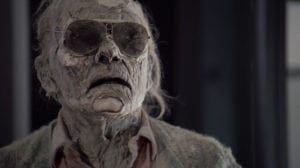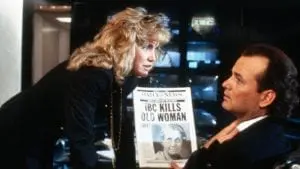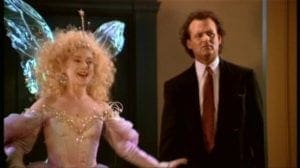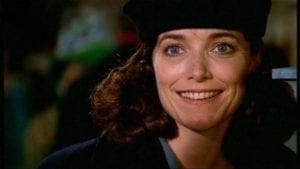Scrooged
"Bill Murray is back among the ghosts. Only this time, it's three against one."
(1988)
starring Bill Murray, Karen Allen and Alfre Woodard
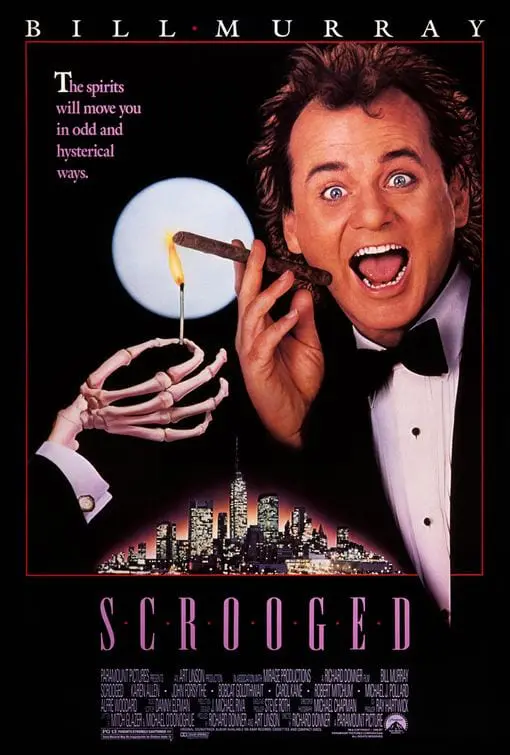
PODCAST:
'80s Movies: A Guide to What's Wrong with Your Parents -
SCROOGED: Why Frank Cross Wasn't Wrong
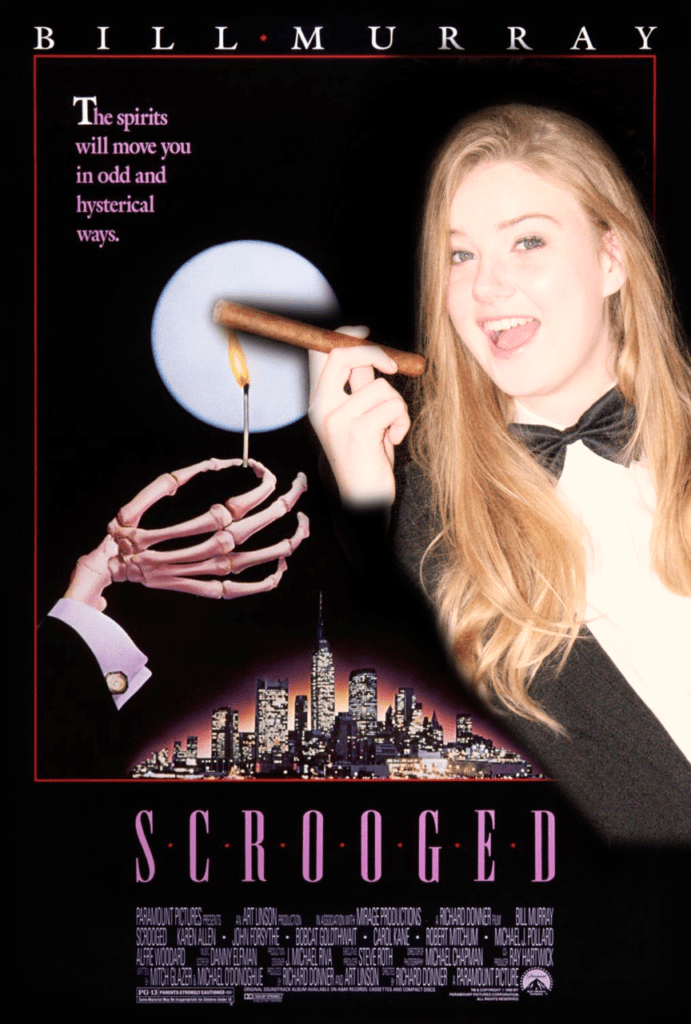
On Christmas Eve, a miserly, cranky television network executive is visited by three ghosts who aim to change his perspective on life.
Why it’s rad:
It's the funniest version of "A Christmas Carol" ever made!
So '80s:
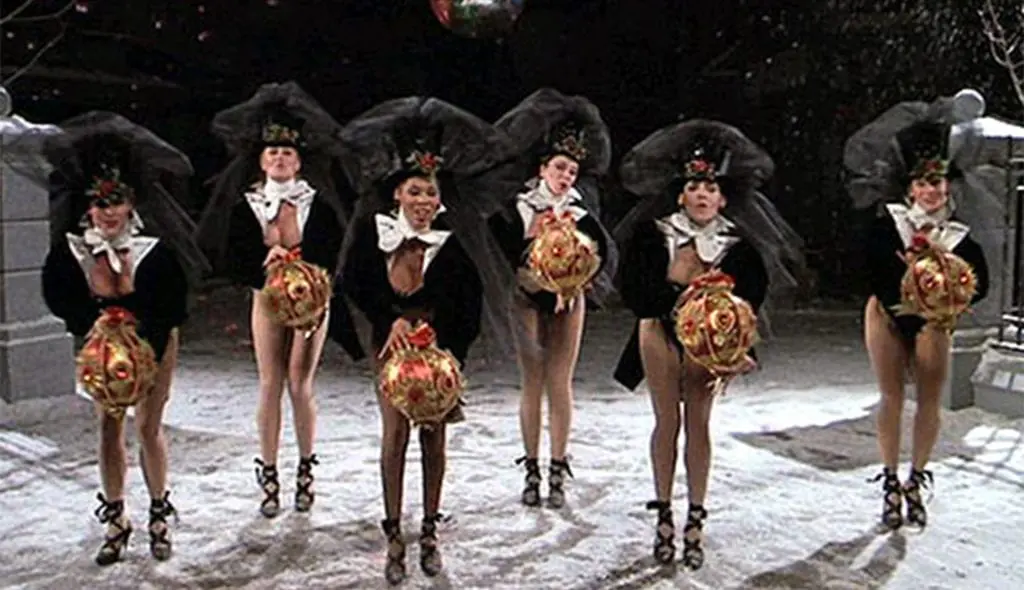
Plenty of '80s to catch in this film, starting with IBC's network programming:
"The Night the Reindeer Died," an uber-violent, action film version of the day "psychos seized Santa's workshop" starring TV star Lee Majors, who was on two loved TV series: the iconic "The Six-Million Dollar Man" and the stuntman series "The Fall Guy."
"Robert Goulet's Cajun Christmas." Goulet was a singer and actor known for his big crooner personality and his mustache.
IBC's live production of "A Christmas Carol" with talent well known to the '80s crowd: comedian Buddy Hackett, Jamie Farr (from "M*A*S*H"), Olympic gold medalist and America's sweetheart Mary Lou Retton, and that '80s relic: The Solid Gold Dancers (a dance troupe on a hit primetime TV series who sexily performed a Top 10 countdown of that week's hits on the pop charts while barely dressed - so '80s!).
Frank's promo for "A Christmas Carol" features fears of the day: “Acid rain, drug addiction, international terrorism, freeway killers. Now, more than ever, it’s important to remember the true meaning of Christmas…your life might just depend on it!” -- accompanied with a cloud from a nuclear explosion.
Frank Cross' office: black lacquer and chrome...and a giant stationary bike.
Frank's predilection for Tab and Stoli.
To his most valued colleagues, Frank's Christmas gift is a VHS player.
Keith Haring's Free South Africa poster makes several appearances. Haring was one of the '80s most famous artists and created the art to protest apartheid in South Africa, which was a cause growing concern in America. Director Richard Donner included the artwork in his next film, Lethal Weapon 2 (1989), another film that takes place at Christmas.
Crack about Richard Pryor being on fire. In 1980, after the legendary comedian had been freebasing cocaine for days, he poured 151-proof rum all over his body and lit himself on fire, then ran through his neighborhood; Pryor suffered second and third-degree burns. The LA Times review points out how cruel the line is because director Richard Donner worked with Pryor after the incident in The Toy. While it is a mean joke, poking fun at the horrific incident wasn't uncommon in the '80s, the charge was led by Pryor himself, who joked about the incident in his 1982 comedy film Richard Pryor: Live on the Sunset Strip. He references a joke that made all the rounds: moving a lit match and saying, "What's that? Richard Pryor running down the street."
Other quips include '80s pop cultural references, starting with:
- Frank saying to his mentor, Lew Hayward: "You're the man who invented the miniseries!"
- "We met at Spago!"
- “LeRoy Neiman is painting The Wall for us.”
- When Frank is in the sewer area under the city sidewalks that's frozen over, he sarcastically says, "Well, this is nice. Where are we, Trump Tower?"
- Claire's Ghost of Christmas Future look is pure "Dynasty."
- ...and Dynasty was one of the most iconic '80s TV shows with a cast led by John Forsythe, who played Lew Hayward.
Only in the '80s would greed be used as a way to inspire people to be kind. In Frank's final monologue, his big Aha! Moment, he says, "I get it now! Then if you GIVE, then it can happen, then the miracle can happen to you! It's not just the poor and the hungry, it's everybody's who's GOT to have this miracle! And it can happen tonight for all of you. If you believe in this spirit thing, the miracle will happen and then you'll want it to happen again tomorrow. You won't be one of these bastards who says 'Christmas is once a year and it's a fraud', it's NOT! It can happen every day, you've just got to want that feeling. And if you like it and you want it, you'll get greedy for it! You'll want it every day of your life and it can happen to you. I believe in it now! I believe it's going to happen to me now! I'm ready for it! And it's great! It's a good feeling, it's really better than I've felt in a long time. I, I, I'm ready. Have a Merry Christmas, everybody."
What’s your damage?
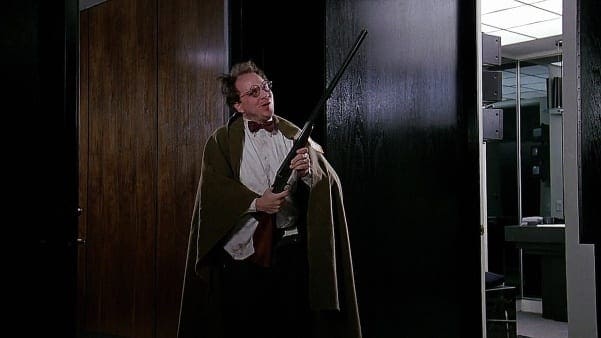
Part of the charm of Scrooged is in how it is so, so '80s. And yet, it holds up better than most '80s films - maybe even better than when it was released. Reviews from 1988 kept coming back to the same word: "mean." Audiences felt that while the film was funny, it was so mean-spirited that it ruined the fun in the theater. Which thing was mean - the suggestion to staple antlers on a mouse? The beating up of a network censor? Firing Eliot on Christmas Eve? Perhaps Scrooged's ability to survive and thrive for three decades is a commentary on how the world has devolved, because now, it feels less mean and more accurate.
Yes, Virginia, Ebeneezer Scrooge was mean, and so was his 1988 counterpart, Frank Cross. Dickens' Scrooge wasn't just miserly, he was crotchety. Both Scrooge and Frank Cross don't see the point in helping those who've fallen or hard times and don't think about the pain they may cause another creature if it helps their own success. (Beating up the censor in a fictional story - well, we just have to give that one as a metaphorical pleasure to Murray and the screenwriters who battled censors relentlessly while working on "Saturday Night Live.") Incidentally, one of the meanest elements in the film is the beating Carol Kane's Ghost of Christmas Present gives to Bill Murray -- and that, the critics praised.
What truly does not hold up is Eliot bringing up a shotgun to the workplace, firing at Frank and threatening his coworkers. While today's audiences might look back and think this was in calmer times when "active shooter" wasn't a term used in schools, clubs, airports, workplaces, and the like. However, 1986 was when the term "going postal" was born - when a postal worker in Edmond, Okla., brought in a gun and fired at his coworkers, killing 14. Unfortunately, this set off a trend among postal workers that continued into the early '90s. So, no, Eliot's shotgun solution was just as uncomfortable in 1988 as it is now. The idea that it's used for comic effect and that Eliot is rewarded for shooting up the office is outrageous.
Behind the Scenes
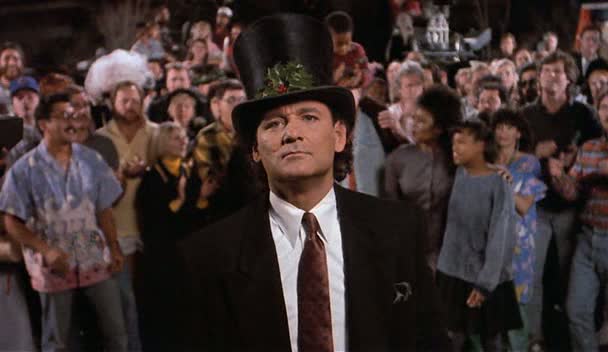
BILL MURRAY'S INVOLVEMENT
Scrooged was Bill Murray’s first film in four years. After the failure of his dramatic turn in Razor's Edge, Murray walked away from Hollywood to spend time with his family - both his own wife and children as well as taking care of his mother during a long illness and his siblings. He and his brother Brian were seen frequently at Mets games. While it took four years before taking another substantial film role, Murray was ready to return to film after two and was even offered Scrooged at that time: he just didn't like the scripts. However, he did take some other acting roles nearby his New York home, taking a part in the play "A Man's a Man" in upstate New York and participating in public readings in Manhattan organized by the playwright-director Timothy Mayer.
After Murray couldn’t find a script he liked since Razor’s Edge, he finally said yes to Scrooged. However, he still didn’t like the script. So, he changed it, elaborating more on his relationship with the girl (Karen Allen).
Murray adored the film's takeaway message. The reason Murray sparked to the script is that it has a takeaway message. He said, "There are moments in the Dickensian morality of 'Scrooged'where you have the creepy chance to contemplate your ruin -the bottom of your future.''
Bill Murray trusted the screenwriters. Mitch Glazer and Michael O’Donaghue worked with him on SNL.
Scrooged is Murray’s first leading role where he carries the film. Part of his success is knowing who he is and how he’s cast. Murray told entertainment journalist T.J. English, “I’m still just like a punk kid, really. I’m just an obnoxious guy who can make it appear charming. That’s what they pay me to do.”
The idea of playing a comedic Ebenezer Scrooge is the concept Bill Murray sparked to. He said, "I just figured that anyone who's good could step into this part and have a lot of fun with it. It's sort of a wicked character. The idea of making a funny Scrooge was an inspired touch. That's what was appealing to me about it."
Murray was paid $6 million to play Frank Cross.
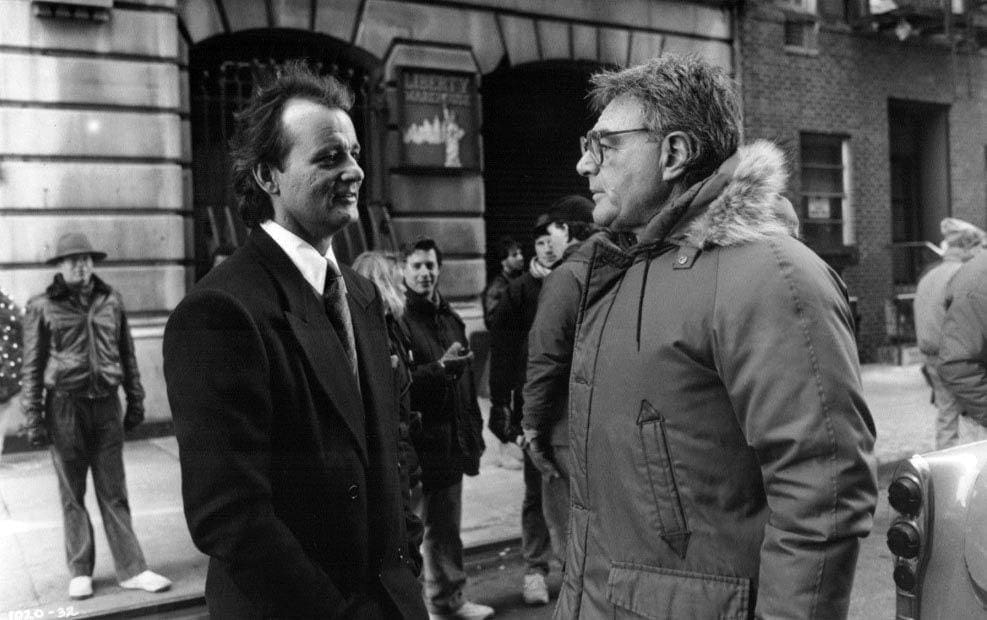
PREPRODUCTION
Richard Donner was a sought-after director in the 1980s. He’d been doing TV for decades, all the way back to the 1950s. In 1976, he directed The Omen, which led to Superman. He went on to direct The Goonies, Lethal Weapon, and executive produced The Lost Boys. "I jumped on the bandwagon when they said it was Bill," Donner told movie critic Roy Faires. "It was a wonderful screenplay and on top of it, to have Bill Murray, and the opportunity to work with Bill."
Bill Murray was always kind, but one entitled fan was too much for him. Murray planned a trip to a Mexican resort with writers Mitch Glazer and Michael O'Donogue as an opportunity for the trio to bond. Of course, other guests were at the resort and Murray was happy to say hi and sign autographs. Glazer told the New York Times, "We did a lot of swimming and hiking, and Billy was really sweet to all the other guests, who loved meeting him. Unfortunately, there was this one Beverly Hills woman, a Rodeo Drive type who wore furs in the blazing sun, and she insisted on treating Billy like he was some ornament to her vacation. On her last day, she was pressing him for autographs and things, and Billy always complied. Finally, she cornered him for yet another autograph and he calmly said, 'O.K., but I'll have to have something in return. I get to throw you in the pool.' She laughed, saying, 'Sure, you do that,' as he signed - and then he went for it, escorting her toward the deep end of the pool. She dropped to the deck, gaping, but Billy reminded her that a bargain was a bargain, and he slipped his hands under her, rolling her - furs and all - into the water.''
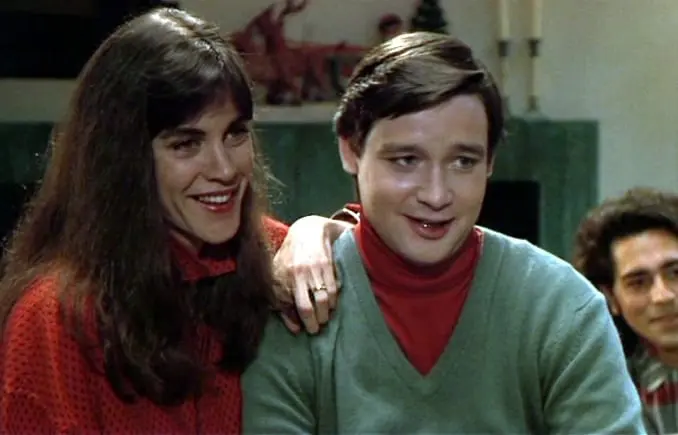
CASTING
Three of Murray’s eight siblings show up in the film: John, who plays Frank’s brother “James;” Joel, who plays a guest at the party, and Brian Doyle, who plays young Frank's disgruntled father. Joel told AV Club about the experience, "Yeah, that was a weird weekday one February—February 29th, in fact—where all four Murray brothers worked on the same picture: Brian was the father in a flashback, Johnny played a brother, and I’d auditioned for it and got the little part at the party. And it was kind of funny, because Johnny and I are doing a scene with our brother Bill, but none of us can acknowledge each other, because he’s a ghost. So that was kind of weird. It was nice to get to work with Billy, but I can’t see or hear him, and he can see and hear me but can’t communicate with me, and… well, anyway, it was awkward."
Frank’s sister-in-law Wendie is played by screenwriter Mitch Glazer’s wife at the time, Wendie Malick. The character is described as "a long-limbed beauty with an easy smile." Glazer and Malick divorced the next year – he remarried another ‘80s movie star, Kelly Lynch (Cocktail, Road House).
Scrooged was definitely about keeping friends and family close, and Murray cast a friend over a more famous comedian for a key role. David Johansen plays the Ghost of Christmas Past and it was. He’s also known as “Buster Poindexter” who had the ‘80s pop hit “Hot, Hot, Hot," in which Murray makes a cameo in the music video. Johansen was a good friend of Murray’s, which is how he nabbed the role over comic legend Sam Kinisen, who had been the leading candidate. Kinisen was publically displeased about losing the role, complaining on Howard Stern’s popular radio show. It grinded him even more because his comedic nemesis Bobcat Goldthwait was cast in the film.
The "starving musicians" with a hat out were more talented than most. Paul Shaffer recruited jazz icons Miles Davis, David Sanborn, and Larry Carlton to be performing on the street of New York as Frank and Claire walk past. That scene was not in the script.
The Solid Gold Dancers were real, they were spectacular, and they were canceled before the movie came out. “Solid Gold” was a TV series that featured popular music performances and a top 10 countdown that had the dancers perform while a short clip of the music played. In the film, they are The Scroogettes, and similar to the film, the Solid Gold dancers would perform in skimpy outfits. As the series was canceled earlier in the year, Scrooged was the Solid Gold Dancers last performance.
Karen Allen met Bill Murray a couple of years earlier at a small New England theater company, but they'd never worked together before. Allen told Coming Soon that he met with Shakespeare & Company in Lennox, Mass., a theater group she was in business with. Allen joined him and a woman who was a big part of the theater company for dinner, and in one interview, she says she and Murray dined together a few times during that time. "So we had kind of gotten to know each other a little bit," she said. Allen doesn't believe their dinner had any impact on her casting, except that they did have a comfort level with each other because of their dinners from a couple of years prior. "I just came in as one of probably many women that auditioned for the role. For the most part we just did improvisations in an office. I think Dick Donner was there. We kind of played around. I think Bill was just looking for somebody that he could be fun and easy with, and I think it probably came down to the fact that we felt really comfortable with each other."
Carol Kane was offered the role of Ghost of Christmas Present by asking her to channel another great performance. Richard Donner said he told Kane, "How would you like to be Billie Burke?" Burke played Glenda the Good Witch in The Wizard of Oz.
Bill Murray charmed Robert Mitchum into taking a small, supporting role. Many were surprised to see the screen legend as Preston Rhinelander. Director Richard Donner told movie critic Roy Faires, "Mitchum wasn't going to play that small part. We said, 'come on in, meet Bill, let's rap, let's talk.' We didn't get a word in edgewise. The minute you get around Bill, you're swooning - everybody is."
The words "Bill Murray" were also key to getting Lee Majors. "I got a call from [director] Richard Donner. I didn’t know him, but he asked if I’d do a cameo, and I said, “In a Bill Murray movie? Sure!” Majors told A.V. Club. "I didn’t know it was going to open the movie. I just got this gun they gave me, and this gun they gave me… I mean, it was so heavy. I was a lot stronger then, and I could hardly hold it up, it was so heavy. It was a real thing! Usually you think they’ll give you a rubber one or a plastic one, some kind of thing they’ve mocked up, but this was an actual gun."
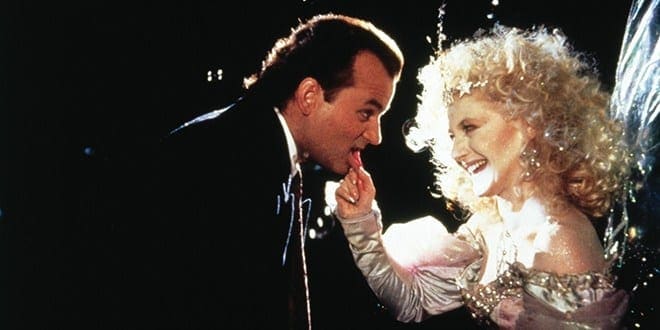
CHARACTERS
Reimaging Ebenezer Scrooge as a network president was spot on in the 1980s. "I can't think of a more perfect portrait of Scrooge at that particular time than to make him a television executive in New York.," Karen Allen told Nerdist. "I don't know what we would make him today. Maybe he'd work for one of those big financial firms. He'd be one of those people who is constantly insider trading and screwing everybody out of their retirement funds."
Frank Cross gets his programming ideas from the tabloids. ''I've seen TV from behind the scenes,'' Murray continues, ''so I draw from that a bit to expose its hypocrisies. As with Frank, most of TV's programming ideas come from the afternoon edition of The New York Post.''
Frank's nickname is "The Smiling Viper. According to the original draft, Frank's description is, "Frank is trim, polished and good-looking. At thirty-eight, he is young for the powerful position he holds. The press still calls him a 'TV wonderkind.' Co-workers call him 'The Smiling Viper.'"
Frank's Stolichnaya and Tab drink is not product placement, it's character insight. Frank drinks his favored mixed drink constantly, except when at lunch with Preston Rhinelander. Most assume it's product placement, but the cocktail is in the script - a Stoli & Tab is called a "Stab."
Claire may be too good to be true, but she's the modern version of Belle from the Dickens original. Belle is Ebenezer Scrooge's true love who broke off the relationship when Scrooge's love for money outweighed his love for her. “She’s a saint, that character,” Allen said. “Really, truly. She is. I think in the actual telling of 'A Christmas Carol,' that character is just a good, loving, generous woman. In this, she becomes a kind of modern day really, really do-gooder. It’s great that she’s a social worker and he runs a television network. It makes complete, wonderful, silly comic sense.”
Karen Allen has often said that Claire isn't realistic, but figured out a way to make her authentic. "The way I filled it in is, I just somehow always imagined that he was who she loved," she said to Syfy Wire. "That she never really got married or got into another serious relationship, so when he makes that call, it's sort of, on some level, she was just waiting to hear from him, waiting for something to bring them back together. I think it's because she sees underneath all that. She remembers the boy that he was before he became the man he became. And I think my feeling was when we were doing it is that she believes that underneath all of that is this sort of true heart that kind of hasn't shown up. It's what Dickens really wrote about: That underneath all of Scrooge's self-centered behavior and greed and unwillingness to care about other people is this person who is capable of it, who's really kind of lost his way."
Scrooged was ahead of its time in portraying women. Mary Ellen Trainor was cast as junior network executive “Ted,” in the script, it doesn’t define Ted’s gender, but it seems that Ted was likely intended to be male. Grace Cooley is written as a black woman and played with sincerity by Alfre Woodard, is the real heart of Scrooged. As BlackGirlNerds points out, “She displays such empathy and compassion, unlike other portrayals of Black women from that era of American visual media. She is loving and strong. Grace doesn’t take Frank’s crap, even as he dishes it out. She’s not Frank’s conscience — she’s an independent voice of reason.”
Carol Kane is the abusive Ghosts of Christmas Present, smacking, slapping and yanking Frank. Kane accidentally pulled on Bill Murray’s lip so hard, she actually ripped it! “There's a piece of skin that connects your lip with your gums and it was really pulled away,” Murray explained of the scene to Starlog. “She really hurt me, but it was my idea to be physical and it was her idea just to hit me as opposed to pulling the punches.”Production halted until his lip healed.
Carol Kane said she loved the Ghost of Christmas Present for her “uncontainable joy,” even if Murray didn’t. “I got such a kick out of the game between me and Bill, which bugged the s--t out of him."
The ghosts are not ghosts -- they're fairies. Lew Hayward may be a legit zombie, but the ghosts are very unghostlike. That's because they're a different kind of supernatural creature. BlackGirlNerds may be the only media outlet to realize the ghosts are actually fairies. Sezin Koehler writes, "The real kinds of Fae folk, mean ones with sharp teeth and claws and fists. If you look closely, you’ll see that the Ghost of Christmas Past (David Johansen) has pointy ears. The Ghost of Christmas Present (Carol Kane) has wings along with her pointy ears and ongoing physical/verbal assaults common to Fae Folk in their dealings with lesser mortals. And the writhing creatures inside the Ghost of Christmas Future are basically goblins and trolls. Some argue that Reapers, or so-called angels of death, are also members of the diverse pantheon of faeries. Scrooged is one of the few times in the history of cinema we see faeries as the complicated, cruel, monstrous, (and sometimes funny) creatures they are."
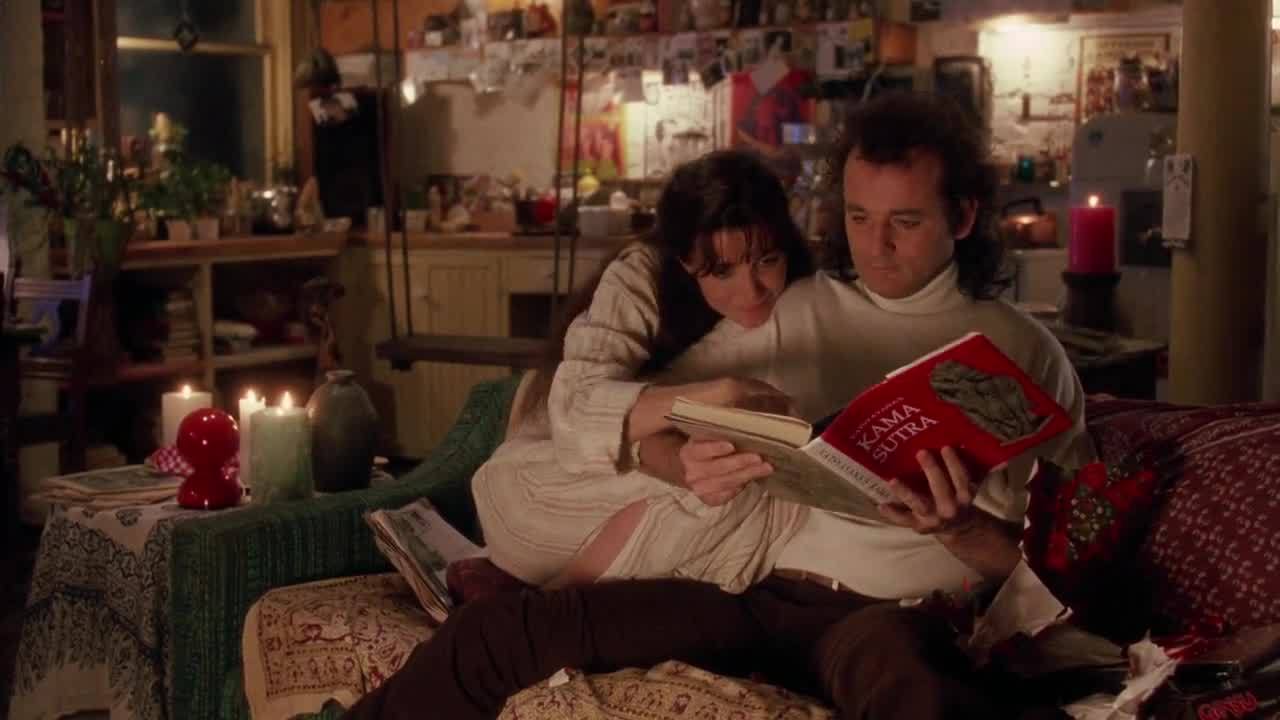
ON SET
Scrooged was Bill Murray’s return to Hollywood. He took four years off after his first dramatic role, The Razor’s Edge, flopped (Murray still mentions this as one of his favorite films that he was in). Frustrated, he took the time to focus on his family, popping in for cameos instead, such as the masochist patient in Little Shop of Horrors. He references the film when he brings the house down with the song “Put a Little Love in Your Heart” and adlibs the line, “Feed me, Seymour!”
However, the four years away did cause Bill Murray some anxiety. Director Richard Donner told the Philadelpha Inquirer that it could be exasperating, at times: "He was nervous. He’d do anything to avoid getting in front of the camera. He’d tell stories. One minute he’s got his wardrobe on, next he’s running around the set without any clothes on."
Murray and Donner clashed. As Wikipedia wrote: Murray said his time on the film as one of "misery," while Donner called Murray "superbly creative but occasionally difficult." The two never worked together again.
Carol Kane, however, appreciated Donner's directing style. During a 2017 Academy of Motion Picture Arts and Sciences tribute, Kane introduced the clip of Scrooged (*cough cough* instead of Murray), comparing Donner to a Little League coach and describing him as "a creative guidance counselor in the most nourishing way."
Bill Murray didn’t like to rehearse. Karen Allen told Vulture, “He wanted things to stay very 'for the first time.' So a lot of times, I feel like he used improvisation to find his way to enter scenes. I think Bill had a resistance to saying the lines that were written, but often he did know them. He had learned them. And sometimes, he would just need to improvise for a while to get to the place where he could actually say the lines. His dialogue came out of a more spontaneous place inside him. So he had his own kind of process.”
Murray’s improv style was in conflict with Allen’s theater training, in which actors say the lines exactly as written night after night. She told Forbes, "Often when you work with actors who come out of the theater or a more disciplined background, things will change from one take to another and grow and deepen, but Bill liked to come from a completely different place each time," she said. "I always had to be very much on my toes when I was working with him, because you never knew where things were going to go."
The writers were available at all hours to handle rewrites on the spot. Karen Allen said on the first morning of filming, they had an outdoor shot to film in New York and it was cold. It’s 5:30 in the morning, and Murray tells her he is concerned with the script. “Suddenly, there’s a little knock knock knock on the trailer door. Standing outside is Michael O’Donoghue in his bedroom slippers and cotton pinstripe pajamas, a coat thrown on…He had this little ski hat on that looked something like what a fourth grader would wear. And he had literally — I’m not kidding — a notebook and a pen! He came inside and tried to work out Bill’s problems.”
Richard Donner fired everyone, the entire cast and crew, right before Christmas. It was in Dec. 1987, and the production wasn't going to be given time off for the holidays. Bobcat Goldthwait recollects, "He fired everybody a couple of days before Christmas under the guise that he was going to hire us all back...So he made sure that we got that holiday. He said, ‘You’re fired’ and everybody cheered. He’s kind of an awesome guy.”
The Ghost of Christmas Present was written as a graceful ballet dancer. Carol Kane told Vulture she worked for a long time to perfect her ballet and had learned to dance on pointe. However, when Scrooged’s art director, Michael Rivas, came to watch Kane rehearse, he burst out laughing. “My whole heart was in it, and I was trying as best I could. But when I started doing it, Michael started laughing hysterically,” Kane said. Rivas went to Donner and advised against trying to make the moment be beautiful, and instead, let Kane be authentic. “My dance was such a mess, but it was the best I could do, and it was the best the character could do.”
Carol Kane was so authentically violent to Bill Murray it worried - and delighted - his brother. Joel Murray told AV Club, "It was fun watching Carol Kane almost take [Bill's] nose off with a toaster repeatedly, if you know the scene. It was frightening how close she came—time after time after time—to killing him."
Bill Murray gave as well as he took when it came to violent, physical comedy - he knocked Bobcat Goldthwait out cold during one scene. Goldthwait told Yahoo! Entertainment that while filming the scenes where Eliot Loudermilk and Frank Cross are tussling with the gun, "he twirled me around and then lets me go; I go flying. But when I went flying, my head hit the back of the elevator, and I passed out briefly! When I came to, I thought ‘I’ve got to let them know I’m OK,’ but they were already walking away from me going, ‘That’s the one, Bill — you killed it.’ And meanwhile I’m like, ‘Number 12 on the call sheet is fine everyone. Don’t worry about me.'”
While Carol Kane plays a zany, happy ghost, the actress wasn’t happy on set. Both Murray and director Richard Donner have said Kane would melt into crying spells on set.
Karen Allen's favorite scene to film was "Future Claire.“That’s one of my favorite scenes because I got to dress up like this Fellini character from 8½ and they made these bizarrely wonderful black and white costumes for us all and put tons of makeup on us,” Allen said to Entertainment Weekly. “If everything had gone wrong, that was who Claire would have become. It’s like Claire’s version of Frank Cross. This is her as the ladies who lunch, the evil women at the Fifth Avenue restaurant.”
Scrooged is about the “redemptive power of love.” Allen described it that way, and said, “In that sense, these characters are not meant to be realistic, which is why it’s such a stylistically heightened film. So to play Claire and Frank, you have to find something that really grounds your characters. That was the key to it for me: Claire had loved Frank since she was a young girl or woman, and there was something that had never gone away even though he had kind of become another person."
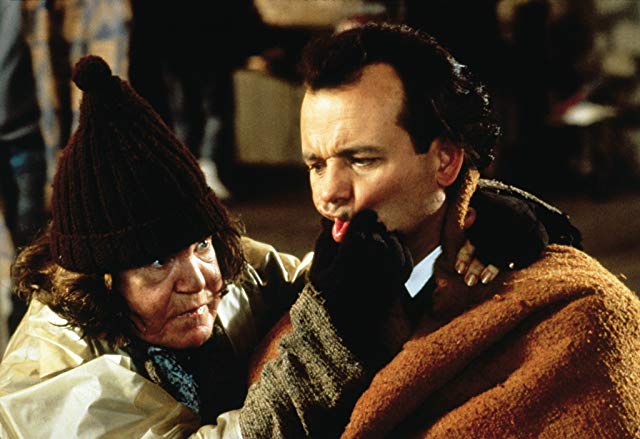
FUN FACTS
Anne Ramsey, who plays the woman in the homeless shelter, had an ancestor who traveled to America on The Mayflower.
Humanitarian awards are the stuff of Hollywood fluff. Frank Cross, who is not a nice guy, is given a Humanitarian Award - and this is a real thing in the entertainment industry. While many successful people in the entertainment industry choose to give back, various "awards" (including humanitarian type awards) are a bit of a scheme. Personalities chosen to receive awards are typically people powerful enough to fill a room. In other words, a person so significant, others in the industry will pay a high price for a ticket or a table to support the award recipient in hopes they'll score their favor.
Frank was too old to have seen the TV shows he recalls as childhood memories, at least he didn't see them as a kid. The timeline the film sets up is that he was born in 1951 as he's four years old on Christmas 1955. That would make him only 17 in 1968, the year he meets Claire and is working in the mailroom at IBC. "The Courtship of Eddie's Father" (1969-72) aired when he was 18 to 21 and the homecoming episode of "Little House on the Prairie (1974-83), which was titled "Mr. Edwards' Homecoming" first aired Oct. 4, 1974, when Frank was 23.
At 37, Frank Cross is referred to as “the youngest president in the history of television.” In real life, the person who holds that title is David Rhodes, president of CBS News, who was given the post in 2011 at the age of 38.
The Gilligan's Island reference is an easter egg. James and Wendie Cross are playing Trivial Pursuit with friends during their Christmas party and they are asked "What was the name of the boat that takes them all to Gilligan's Island?" Richard Donner directed three episodes of the TV sitcom classic.
Bill Murray began acting “as a fluke” while attending an all-boys Catholic school. “I was walking down the hall by this theater, and there were girls in there. So, I went in there to see if they needed help.” He learned they were holding auditions for a show – which meant he could get out of study halls during the day and get out of the house at night, so he was in.
Murray’s favorite version of Ebeneezer Scrooge is Mr. Magoo. He told the New York Times about his preference for "Mister Magoo's A Christmas Carol," "Maybe it's just me, but I thought there was a lot of truth in the exaggerated vulnerability of the near-sighted little cartoon guy," he said.
The filming of Scrooged coincided with the release of films of other Saturday Night Live performers: Caddyshack II with Chevy Chase, Coming to America with Eddie Murphy, and My Stepmother is an Alien with Dan Akroyd. To celebrate this first-ever occasion, Murray and Peter Akyroyd (younger brother of Dan) hosted a party: the first ever SNL Alumni Reunion Party.
The names carved into Frisbee's tree seem oddly specific. "Dick + Lauren" refers to director Richard Donner and his producer wife, Lauren Schuler Donner, who produced '80s canon films Pretty in Pink, St. Elmo's Fire, and Mr. Mom.
Three of the actors would later be Gong Show judges: Jamie Farr (the "Scrooge" TV production's Marley), Mabel King (Gramma), and Pat McCormick (the "Scrooge" TV production Ghost of Christmas Present)
The Scrooged screenwriters have cameos. Michael O'Donoghue is the priest for the funeral in Christmas Future, Mitch Glazer is a partygoer.
Even the director's cousin found a spot as an extra. Richard Donner and his cousin works are seen in the production control room during the live performance.
Two well-respected actors passed away before the movie was released. Anne Ramsey (the homeless woman) died on Aug. 11, 1988. John Houseman (the “Scrooge” narrator) died Oct. 31, 1988. Scrooged was released Nov. 23, 1988. Scrooged was dedicated to Ramsey, as well as production manager Roger Rothstein, and the fim's construction coordinator Robert Scaife.
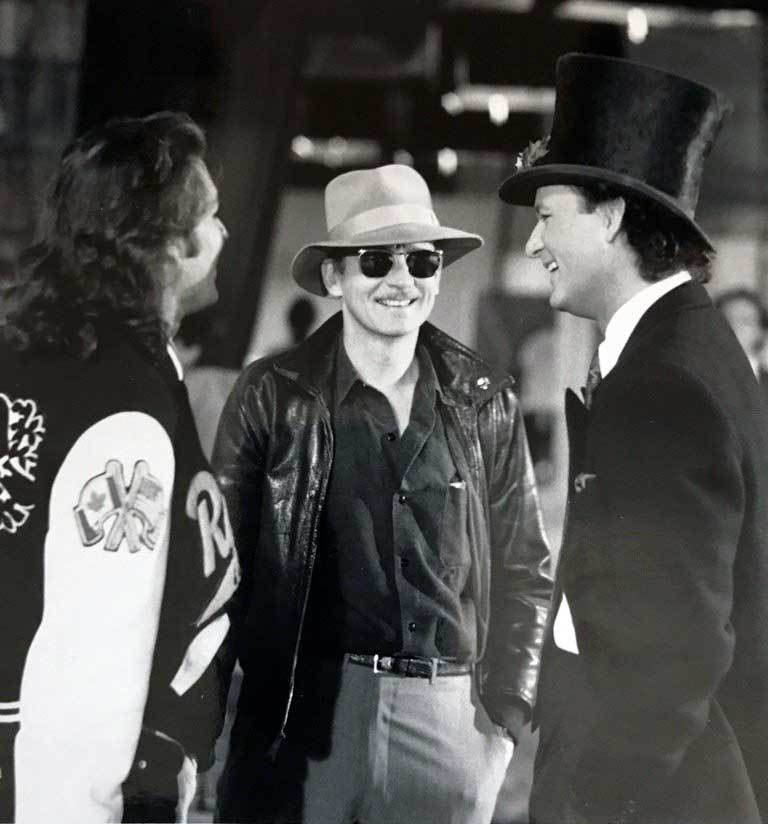
FRUSTRATION AND "MISERY"
Bill Murray tried to create a set filled with friendly faces and the best of the best. However, the film was full of contentious arguments as key filmmakers didn't see the film the same way. In the 1993 interview "Triumph of the Bill," Murray told Entertainment Weekly he and Donner had conflicts over direction and tone.
Murray felt the pressure of carrying a film alone, and alone is how he felt. He told Starlog Magazine, "Scrooged was a miserable gig. I had much more fun on The Razor's Edge, which made no money. But I got to go around the world and meet all kinds of people. On Scrooged, I was trapped on a dusty, smelly and smokey set in Hollywood for three-and-a-half months, having a lousy time by myself, and just coughing up blood from this fake snow that was falling all the time. "
Murray rewrote the entire script with O'Donoghue and Glazer. He told Starlog Magazine, "We tore up the script so badly that we had parts all over the lawn,” Murray told Starlog. “There was a lot I didn’t like. To remake the story, we took the romantic element and built that up a little more. It existed in the script’s original version, but we had to make more out of it. The family scenes were kind of off, so we worked on that."
Here's the problem: Screenwriter Michael O'Donoghue wanted Murray to follow the script. Murray believed the script was a starting block. Director Richard Donner wanted to actually direct the film as he saw it, - you know, because he's the director.
Michael O'Donoghue and Mitch Glazer wrote a dark, cynical R-rated comedy. Richard Donner directed broad, commercial blockbusters like Superman and The Goonies. The studio reportedly got involved to make sure they had a Christmas tentpole. The film's tone was lightened, some of Frank's more dastardly behavior softened, and much of the cursing removed.
Murray's improvisational style created issues for the filmmakers: "[With improvisation], you’re just kind of freewheeling it and you end up shooting a lot more. It’s not like a skit on Saturday Night Live where you have a grain of an idea and it’s got to last two or three minutes. So while there may be a lot of freedom in improvising, the cost is that it can often take two or three times longer to shoot a scene," said Karen Allen. "I remember lots of things that were shot that didn’t make it to the film. But they probably weren’t in the film because they didn’t belong in the film."
Bill Murray concurred about the confusion that the improv created. "We shot a big, long sloppy movie, so there's a great deal of material that didn't even end up in the film. It just didn't work. You tend to forget what was wrong. It's hard."
The final ending scene was in the spirit of what the writers created, but completely made up by Bill Murray on the fly - which did not go unnoticed by the screenwriters. During filming, Mitch Glazer thought Murray was having a breakdown in real life. At the end of Murray's speech, Dennis Perrin wrote O'Donaghue said, "What was that? The Jim Jones Hour?”
Karen Allen said every take was different, but no take was the writer's take. “I think that scene was scheduled to be shot in half a day, possibly a day, and Bill was pretty convinced that he wanted to improvise that scene," she told USA Today's App.com. "Something had been written for him that I believe was not at all as lengthy, I don’t remember now exactly what was written but I think we spent three days shooting that.”
"He did it again and again and again, and it went off in different directions every time. And, I can imagine the writers with their jaw dropped," Karen Allen told Coming Soon. "It’s the ending of the film, so I know writers put so much into what they’re doing and they give it so much thought and so much of their passion and write and rewrite."
Murray blamed director Richard Donner for the film's bad reviews. Roger Ebert asked Bill Murray if he had disagreements with the director, to which Murray replied: "Every single minute of the day. That could have been a really, really great movie. The script was so good. There's maybe one take in the final cut movie that is mine. We made it so fast, it was like doing a movie live. He kept telling me to do things louder, louder, louder. I think he was deaf."
Michael O'Donoghue disavowed the film. O'Donoghue told Premiere Magazine that only 40 percent of what he and Mitch Glazer wrote made it to the final product: “The film was a piece of unadulterated, unmitigated s--t. I’ve seen that picture once, and I’ll never see it again.”
Score composer Danny Elfman was also unhappy about the way the film turned out. Elfman wrote about his score for Scrooged: "The original tone of this film, as you can hear in the music, was much darker than what ended up on screen. Although the score was a pleasure to write, it was pretty much buried in the final film. Another one of 'life's bitter pills'...Oh well." It's in the liner notes of Danny Elfman's Music for a Darkened Theater: Film and Television Music Volume One, which was released in 1990.
Oscar-winning cinematographer Conrad Hall was fired five days into shooting. Instead, he shot Tequila Sunrise (1988) and was nominated for another Academy Award.
Carol Kane's violent take on the Ghost of Christmas Present wasn't exactly how Bill Murray saw the character. Murray said to Starlog: "She really hurt me, but it was my idea to be physical and it was her idea just to hit me as opposed to - pulling the punches." Asked if he would consider teaming with Kane again in the future, Murray chuckles, and in a sly does-he-really-mean-it tone, he replies, "Over my dead, lifeless body." Murray never worked with Carol Kane again.
One of the IBC holiday specials is missing from the film. In the script: "At 9 o'clock, Someone is killing sidewalk Santas and only Loni Anderson can stop him in 'Fat, Jolly, and Dead!"
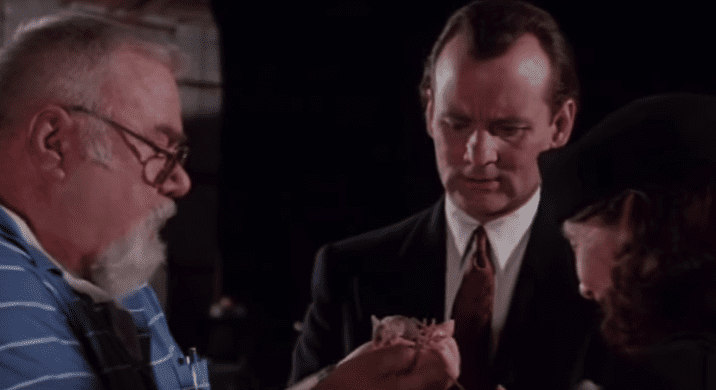
UNUSED MATERIAL
Originally, the antlers are stapled to the dormouse. In the script, after Frank orders the prop man, “Try staples.” The script then reads: “The Prop Man looks at the mouse, shrugs, and exits.” Then, Frank talks to Claire, who doesn’t mention the incident.
The “Richard Pryor” crack is not in the script, Murray ad-libbed it.
Wollman Ice Skating Rink is where Claire and “Lumpy” originally meet. She unknowingly sets off a chain reaction of skaters crashing and falling while she skates, unscathed. That is, until she hits the railing and bangs Frank’s head.
Frank and Claire were planning to join the Peace Corps. In the original script, Frank and Claire talk about their international service during the 1969 Christmas Eve present exchange. On Christmas 1971, Claire arrives at the Frisbee the Dog show, excitedly delivering the news to Frank that they were accepted into the Peace Corps. Lew shows up on set and discusses the next scene with Frank, suggesting Frisbee eat the dogfood and then throw it. Claire continues to enthusiastically talk about their assignment in Africa. Frank is distracted, and Claire says, “We’ve been talking about this trip since the day we met!” Frank responds, “I can’t just walk out of here at the drop of a hat. I owe a little something to the kids. Look, why don’t you go and as soon as I can, I’ll meet you there.” Claire grabs the dog food and dumps it on Frank’s head before storming out.
Frank's therapist gets a lot of attention in the script. Frank calls, refers to, and visits his therapist, Dr. Rosenblum, who says Frank is experiencing stress. Dr. Rosenblum says, “My god, you’re doing a TV show about a man who's visited by ghosts. I’d be worried if you weren’t dreaming about them!”
Gramma Cooley was written as "a loony 'Koko Taylor' type blues mama." When The Ghost of Christmas Present brings Frank to the Cooley house, the grandmother starts singing Three Dog Night’s “Joy to the World,” eventually “windmilling her beat-up Telecaster for all she’s worth, and the entire Cooley clan dancing, as does Frank, until the Ghost tries to pull him out to move on…Frank who is “frugging wildly” says to the Ghost, “Lighten up Mama! Get in the zone. Let’s get ill!”
Frank’s great line to the “Scrooge” production, “Break a leg, everybody! I feel real weird about tonight.” was improv. The line was written as “Good luck guys..um…I feel magic tonight!”
Mel Gibson got a Picasso out of an unused moment written in the Scrooged script. The ghost of Lew Hayward was originally to set Frank’s Picasso on fire. Four copies of Picasso’s “Woman with an Artichoke” were made for the film that was never shot. The four were given to Richard Donner, production designer Michael Riva, the original cinematographer Conrad Hall, and Mel Gibson. Donner filmed Scrooged in between the Gibson-starrers Lethal Weapon and Lethal Weapon 2.
The script was full of even more ‘80s behaviors or references that didn’t make it into the film.
- Originally, Frank threatens Grace’s job if she doesn’t work late by saying, “If it’s a problem, I’m sure there are lots of younger, whiter secretaries who would just love your job.”
- Mayor Ed Koch was written as attending Frank’s humanitarian award ceremony.
- Before Lew Hayward interrupts, Frank is watching another IBC Christmas special: “Jacques Cousteau’s Christmas Underneath the Sea” with John Denver playing “Calypso” in the background.
- In IBC’s “Scrooge,” Republican House Speaker Tip O’Neill was written into play Marley and Marlon Brando was Scrooge.
- When the Ghost of Christmas Past says that Attila the Hun cried, Frank interrupts telling him to “Save it for the Donahue Show.”
- Claire and Frank’s relationship originally sparks over their love (and debate) of the J.R.R. Tolkien book, “The Hobbit.” The late ‘60s saw a resurgence in the tale as it moved into TV, film and radio adaptations with the rights sold (originally) to United Artists.
- At the homeless shelter, one of the transients is wearing a “Frankie Says Relax” shirt (they were everywhere in the ‘80s).
- LeRoy Neiman is shot by East German guards while painting the Berlin Wall.
CHRISTMAS INSPIRATION
As a child, Bill Murray never got toys for Christmas. Murray grew up as one of nine children. He said he never got veal cutlets for Christmas, but said what was found under the tree was still on the practical side. ''Asking for toys was out of the question, they were low priorities. It's not that we were denied anything so much as the fact that we knew not to make requests. For Christmas, you got essentials: school clothes. Whenever toys surfaced at all, they were pretty much inherited," said Murray in a New York Times interview. “Usually the boys got a comb and the girls got a hairnet,” he said.
Murray said one year, he was particularly bad at giving gifts - although his heart started in the right place. He said usually someone would give each of the kids a dollar to go get presents, so one year, he got his family peanuts -- the hot ones you see sold by street vendors. He wrapped it in tinfoil and put it under the tree. “About every six hours, I’d get a craving for peanuts, so I’d go under the tree, and take a couple from someone’s gift,” he said.
Brian Doyle Murray, who plays the dad who gives the terrible holiday present, is actually “the worst” at Christmas gifts in real life, according to brother Bill. He explains that Brian will go buy a bunch of socks – like 40 pairs – then carry them around all month and hand them out “like he’s Father Christmas.”
REVIEWS
The reviews were not good. Gene Siskel was one of the few major critics that recommended the film, calling Bill Murray "absolutely hilarious." Siskel didn't give it all praise, but decided, "It's a close call but I'm giving this movie a thumbs up for it's big laughs early on and a sweet relationship between Bill Murray and Karen Allen toward the end of the picture."
Variety described Scrooged as "an appallingly unfunny comedy, and a vivid illustration of the fact that money can't buy you laughs. Its stocking spilling with big names and production values galore, this updating of Dickens' A Christmas Carol into the world of cutthroat network television is, one episode apart, able to generate only a few mild chuckles."
"A holiday turkey" is how The Hollywood Reporter saw it, but then also called the film "wickedly amusing," "splendidly scrambled story," and Carol Kane "a certified hoot." The review recognizes Murray as the reason the film works: "With his deadpan, cut-through-it style, Murray is hilarious as the network czar. His deadpan putdowns — his voice pulsating with flat disdain and his open glare shooting darts — are scrumptiously condescending. Despite the juicy, on-the-edge craziness, Murray is able to layer his outrageous histrionics with an inner sensibility, making his ultimate transformation not only believable but Christmas-cheer uplifting.
Legendary movie critic Roger Ebert gave Scrooged only one star – and Bill Murray confronted him about it. Here is the exchange that took place as Murray was shaving in the hotel suite where he was meeting Ebert for the interview (that sounds weird…but press interviews are typically held in hotel suites):
"How do you plan to explain your one-star review of 'Scrooged'?"
"I was hoping it wouldn't come up," I said.
"It wasn't that bad," Murray said. "It had some good stuff in it. Watch it on video and you'll see."
The New York Times gave it a mixed review, the headline touting Scrooged as "Meanness' Outer Limits." However, critic Vincent Canby writes that many scenes are very funny. The lede paragraph, though, nails Bill Murray's acting style with precision:
"Locked deep inside Bill Murray there is a small, hyperactive misanthrope fighting to be heard through the large heavy body that contains him. The misanthrope never sleeps. He's a busy demon, peering out through Mr. Murray's squinty eyes, seeing all and remaining actively unimpressed. By the time his nastiest observations fight their way to the surface, however, much of their sting has been absorbed by flesh, leaving a sometimes revivifying but thoroughly domesticated skepticism.
"Because Mr. Murray is funniest when the big, laid-back, good-natured slob gives in to the furious mini-misanthrope, ''Scrooged,'' an updated variation on Dickens's ''Christmas Carol,'' is best when Mr. Murray is allowed to be his secret self."
The Los Angeles Times critic called it "as funny as a mugging." The piece's headline read, "'Scrooged' a Mean-Spirited Holiday Satire." Sheila Benson wrote that "Scrooged is a mass of sharp, well-deserved paper cuts" and felt that Murray was miscast: "'Scrooged" also seems like a misreading of the qualities on which Murray built his career: the hipster's put-on, the pious mien covering deep insincerity. Frank Cross isn't insincere; he's really and truly a heartless, friendless, useless fleck of pond scum. Wrong reading, guys."
Audiences had an entirely different reading on the Christmas comedy. Perhaps critics didn’t like it, but test audiences did. The film rated it a 93 percent “Very Good” rating – the highest Paramount had ever received.
HOW THE SOUNDTRACK AND SCORE CAME TO BE
Richard Donner originally wanted John Williams to score the film. Danny Elfman was established as the frontman for Oingo Boingo but was an up and comer in the scoring world. Donner was talked into giving Elfman a shot.
Scrooged helped Elfman find his "sound." At the time he was hired for Scrooged, Elfman was known for his work scoring comedies. such as Tim Burton's Pee-Wee's Big Adventure, Back to School and Summer School. However, Scrooged's horror elements helped him to establish some of the elements that would find its way into the score for Batman, his most iconic work, which was created the next year.
Living music producing legend Jimmy Iovine assembled the soundtrack. AllMusic’s Heather Phares’ review of the soundtrack reads: “The album's sound, as well as its roster of artists, give it the feel of a time capsule buried in the late '80s, for better or worse. While Natalie Cole's "The Christmas Song (Chestnuts Roasting on an Open Fire)" fares the best, most of the album, including Annie Lennox and Al Green's "Put a Little Love in Your Heart"; Miles Davis, Larry Carlton, David Sanborn, and Paul Shaffer's "We Three Kings of Orient Are"; and New Voices of Freedom's "Sweetest Thing" bring back bad memories of the cold, brassy sound that dominated the decade's pop. Though Scrooged may appeal to fans of the movie, they may be taken aback by how badly the soundtrack has aged.”
The soundtrack produced a Top 10 hit. The movie’s primary single, “Put a Little Love in Your Heart,” performed by Al Green and Annie Lennox reached #9 on the Billboard Hot 100 on January of 1989 (and #2 on the Adult Contemporary chart). As a result, many now considered it a Christmas song, although it says nothing about the holiday. In fact, it’s a remake of a Jackie DeShannon song from 1969. The single came together when Iovine convinced Al Green, considered one of the greatest soul singers of all time, to come out of pop music retirement to record the song. Green had left mainstream music in 1980 to become a pastor and had dedicated himself to making gospel music. Green requested Lennox to duet with him on the song. It’s the highest-charting hit for Lennox without her band, Eurythmics. It should be noted, though, her Eurythmics partner Dave Stewart produced the single.
The success of "Put a Little Love in Your Heart" resulted in a backlash against Rev. Al Green from the Christian community. Even members of Green's own Memphis congregation had an issue with his crossover success. Because of the song's "love one another" lyrics, Green was baffled. He said, “I just couldn’t understand their (objections). “There is a whole bunch of religious people having such frustrations with love and happiness. . . . And I didn’t have any problem with that, otherwise I wouldn’t have sung it.”
Annie Lennox and Al Green’s “Put a Little Love in Your Heart” music video got an MTV Video Music Award nomination for Best Video from a Film. It lost to the U2 and B.B. King collaboration, "When Love Comes to Town," a video taken from the U2 documentary Rattle and Hum – which was responsible for another one of the Scrooged tracks…
The “New Voices of Freedom” was a band created as a result of an idea by U2. The U2 hit “The Sweetest Thing” is performed by the gospel choir "New Voices of Freedom." But who are they? Interesting story – Dennis Bell was a music producer who conducted church choirs. Buzz had been generated for a gospel choir version of Foreigner’s “I Want To Know What Love Is,” and Island Records’ A&R executive Joel Webber approached Bell about arranging a church choir to similarly perform U2’s “I Still Haven’t Found What I’m Looking For.” Bell, his pianist wife, and his jazz singer sister-in-law Lynette Washington assembled a group from Bell’s high school choir and professional singers, and the final arrangement was one created by Bell and Bono, performed and featured in the U2 documentary Rattle and Hum. Later, the group performed with U2 at Madison Square Garden and after the show, Bono asked if Bell could do the same gospel choir version with “The Sweetest Thing.” Once the song was complete, there was a question of what to do with it. Bell brought it to Iovine who put it on the Scrooged soundtrack. Iovine’s label, A&M, offered New Voices of Freedom a record deal, but it fell apart, and the group called it quits in 1991.
“Christmas Must Be Tonight” was a cover performed by the original artist. Robbie Robertson wrote the song for his young son, Sebastian, and put it on the “Northern Lights-Southern Cross” album of his music group, The Band, in 1975. In 1987, Robertson was having a moment as a solo act with a new, self-titled album. – and working with, you guessed it, U2. Additionally, he was developing a resume for creating soundtracks and scores for film with Martin Scorcese, such as in The Last Waltz, Raging Bull, Carny, The King of Comedy, and The Color of Money. He recut “Christmas Must Be Tonight” for inclusion on Scrooged.
Dan Hartman was a soundtrack hit machine. “The Love You Take” came from Dan Hartman and Denise Lopez. Hartman had a knack for making songs that worked – and would chart – on soundtracks, such as:
- “I Can Dream About You” from Streets of Fire (#6 in the U.S., #12 in the U.K.),
“Living in America” performed by James Brown from Rocky IV,
“Relight My Fire” which became the theme song for the NBC show “Tomorrow,”
“Heart of the Beat” from Breakin’ under the band name 3V,
“Talking to the Wall” from the John Travolta-Jamie Lee Curtis aerobics movie Perfect
“Waiting to See You” from Ruthless People,
“Why Should I Worry” from Oliver & Company
“9.95” performed by Spunkadelic from Teenage Mutant Ninja Turtles
“(That’s Your) Consciousness” from Teenage Mutant Ninja Turtles: The Secret of Ooze.
“The Love You Take” was one of Hartman’s last contributions to a soundtrack. He told the Mohave Daily Miner in March 1989: "I wish they'd snap out of having rock songs in films to try and sell the film, and go back to writing good scripts and making good films. I think ultimately they don't care about songs anyway. I got tired of cranking out pop songs that end up over the credits at the end. It's territory I moved through and don't want to do anymore." And mostly, he didn't, although after Hartman died of an AIDS-related brain tumor in 1994, his music was tapped for soundtracks once more:
- In 1995, Hartman’s version of “Free Ride” -- a song he wrote that was a hit for Edgar Winter – was put on the Mighty Morphin Power Rangers soundtrack.
In 2006, “I Can Dream About You” was featured in the video game Grand Theft Auto: Vice City Stories - “Relight My Fire” was included in the video game Grand Theft Auto: The Ballad of Gay Tony.
Natalie Cole’s cover, “The Christmas Song,” was originally written as a visualization technique to cool off in the July heat. The song was a huge hit for her father, legend Nat King Cole. The lyrics for the song, written in 1945, came from Bob Wells writing down words “Chestnuts roasting…Jack Frost nipping…Yuletide carols…Folks dressed up like Eskimos” in the middle of summer to help him be cool by thinking cool thoughts. Mel Torme said he saw the words written on a pad of paper and finished up much of the lyrics and wrote the music.
David Johansen was a bonafide music star. A kid in the ‘80s may have found “Buster Poindexter” a novelty act with his "Hot, Hot, Hot" pop hit, but Johansen had been the lead singer of the glam rock band New York Dolls. In the late '80s, became part of the Saturday Night Live house band...and by the way...
Paul Schaffer and David Sanborn were members of the Saturday Night Live house band in 1975. Schaffer continued on through 1980, therefore overlapping with Bill Murray's time at SNL (1977-80). Schaffer asked Sanborn and Larry Carlton to join him for the street performance scene - jazz icon Miles Davis joined them.
Paul Schaffer wasn’t the connection to Miles Davis, it was Bill Murray. Schaffer told Vulture: "Bill Murray was doing Scrooged, and there’s a scene in the movie where Billy’s character is walking down the street and passes a group of musicians playing for spare change. The music director from the movie studio had the idea that one of the musicians should be Miles Davis. Somehow Miles said yes. Billy called me and told me and I said, ‘What?’ And he said, ‘Yes, I got you an opportunity to play with Miles Davis.’
Miles Davis taught Schaffer how to perform jazz differently during the soundtrack recording. “I was playing a keyboard in that scene, which goes by so fast that you have to freeze-frame it to even realize who’s in it — we’re playing ‘We Three Kings,’ by the way. Even though that scene is only a few seconds, we did cut a full version of the song in the studio for the movie’s soundtrack. I mean, getting to go into the studio with Miles was incredible. He completely took over the session and started arranging the material. We were working from the sheet music for ‘We Three Kings’ and he looked at it and told us we’d do it in waltz time and then move to a funk section and then go back and forth between the two. The crazy thing is that I was playing synth bass and Miles was really zeroing in on what I was doing. That’s when he unlocked the key to his spacey Jack Johnson, Bitches Brew-style of jazz for me. He told me not to play the root note of the chords on the bass. He said I could play around it or suggest it, but I couldn’t play the root. Once you learn that, you understand the secret to the music he made during the second half of his career and why it sounds so free-form. Anyway, when we were finishing the session, Miles said to me, ‘We could do this one on Letterman.’ Not long after, he came on the show and we did ‘We Three Kings.’ Working with him was a million-dollar music lesson for me.”
Plenty of familiar tunes are used in the film to punch up the atmosphere:
- TV tie-ins: "The Toy Parade" (which you know as the theme to "Leave it to Beaver), Robert Goulet's crooning clip of "Silver Bells" to promote his IBC special "Robert Goulet's Cajun Christmas," "The William Tell Overture" used as "The Lone Ranger" theme song, and "It's Howdy Doody Time!" for the children's program when young Frank was watching TV.
- "Wooly Bully" by Sam the Sham and the Pharohs plays as the introduction to 1968 when Frank is working in the IBC mailroom, delivering mail during the wild IBC office Christmas party.
- "The Nutcracker Suite" is interwoven into The Ghost of Christmas Present's open, The Ballbreaker Suite.
- "Jingle Bells" plays when frozen Herman's pocketwatch slides down his hand.
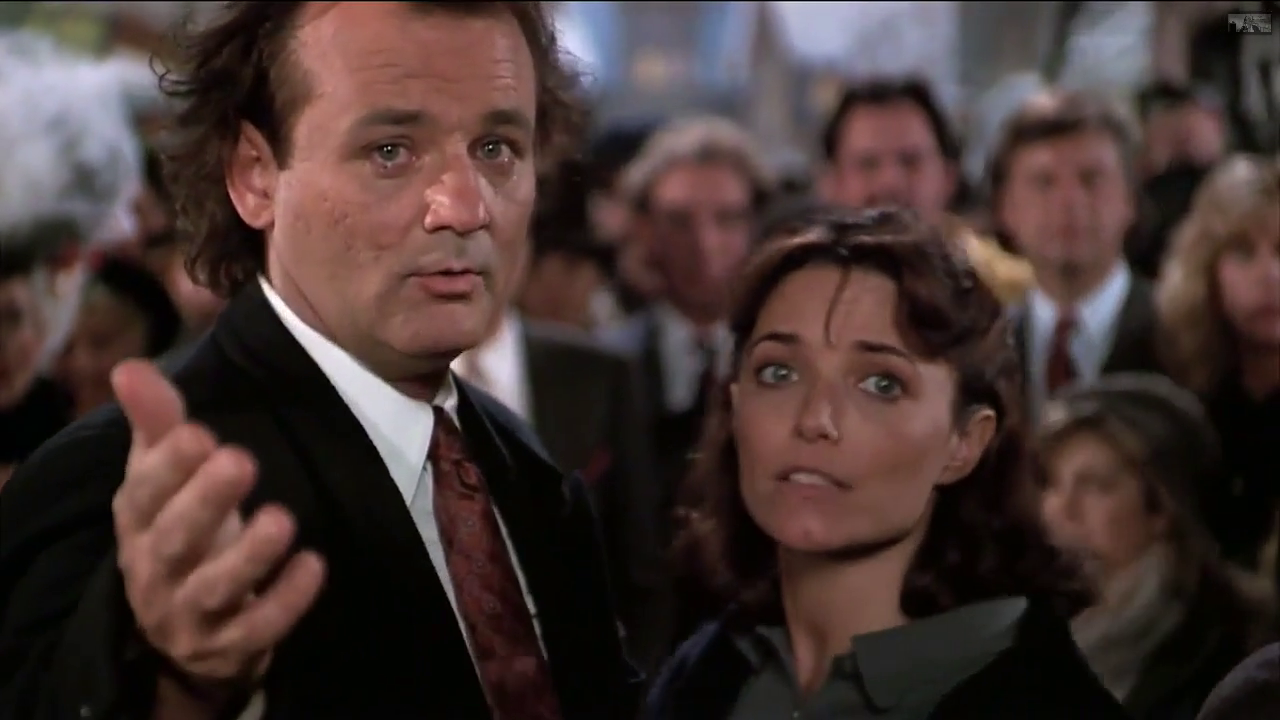
LEGACY
Murray compared his next film, Ghostbusters II to Scrooged, and at the same time, defined what he intended his own legacy to be, saying they were both “a story about innocence restored, and good values, and the power of faith in ordinary people." Murray said, "Sounds corny but I'd like all my stuff from here on out to be things you wouldn't be afraid to let your kids' kids discover decades from now. Like I discovered 'A Tale of Two Cities' or even Mr. Magoo.''
"I think it’s become a kind of classic Christmas film and people love to put it in the mix because there all these other wonderful Christmas films that we all watch,” Karen Allen said to MonstersandCritics.com. “White Christmas and It’s A Wonderful Life, Miracle on 34th Street. A lot of them are beautiful and poignant and sweet and heartwarming but Scrooged is irreverent and wonderful and silly.”
Scrooged was a film before it's time, both in reception and predictions:
It was pre-meta. Scrooged is one network executive living A Christmas Carol while producing a live version of A Christmas Carol while the audience is watching a version of A Christmas Carol. To play on this, the font on the TV script matches the movie poster and credits.
Preston Rhinelander's prediction that pets were an untapped and profitable market. It's a joke in the film, but the rise of Animal Planet, The Puppy Bowl, and cute cat videos would say Preston was on to something.
Soundtrack
The Scrooged score came from Danny Elfman. The soundtrack consisted of '80s takes on Christmas classics. Annie Lennox and Al Green's take on Jackie DeShannon's "Put a Little Love in Your Heart" remains the big takeaway from Scrooged, but Natalie Cole's "The Christmas Song" still gets play on radio today as well. The jazz quartet of Miles Davis, David Sanborn, Paul Schaffer and Larry Carlton performing "We Three Kings" was lifted from the scene where they performed on the street. "Buster Poindexter" has a track as well -- he's also known as David Johansen aka "The Ghost of Christmas Past."
Director: Richard Donner
Screenwriters: Mitch Glazer | Michael O'Donoghue based on Charles Dickens novel.
Release Date: Nov. 23, 1988
Rating: PG-13
Opening Weekend Rank: #1. The Land Before Time was at #2, Oliver & Co. was #3, and Cocoon: The Return was #4 (and was the only other new wide release).
Opening Weekend Box Office: $13 million
Lifetime Gross: $62.3 million
Budget: $32 million
Production Company: Paramount Pictures
Distributor: Paramount Pictures

